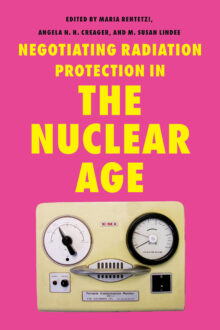
M. Susan Lindee
M. Susan Lindee is the Janice and Julian Bers Chair of the History and Sociology of Science at the University of Pennsylvania and the author of Rational Fog: Science and Technology in Modern War, Suffering Made Real, The DNA Mystique, and Moments of Truth in Genetic Medicine.
Negotiating Radiation Protection in the Nuclear Age
The development of nuclear technologies for war, medicine, and energy production dramatically increased the number of people exposed to artificial radioactivity and raised new stakes and questions about protecting them. This volume examines how the establishment of standards and protocols for radiation protection was not only a technical process, but also the byproduct of extensive and ongoing negotiations among scientists, states, international bodies, lawyers, economists, companies, unions, and activists. Over time, exposed individuals—whether Japanese survivors, accident or fallout victims, atomic veterans, or workers—have leveraged their own experiences of radiation exposure to challenge powerful institutions and their standards. Contributors explore radiation risk and protection policies across the globe, from Japan to Canada, the United Kingdom to North Africa, and Spain to Greece. They excavate the legal, scientific, diplomatic, and personal challenges posed by radiation protection. Chapters move from the individual and institutional to the global level, arguing that issues of radiation exposure, like so many other forms of risk, are never merely personal but deeply, often invisibly, political and diplomatic.

